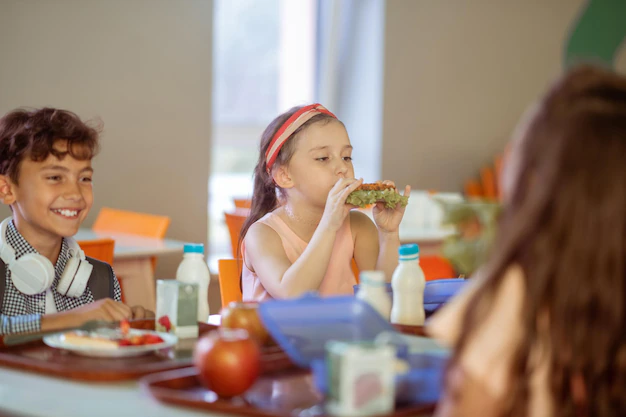Main Highlights:
- The percentage of children eating free school lunches climbed
- The national free school lunch voucher programme
- The breakfast club initiative for underprivileged children
As the pandemic’s early economic effects on household earnings took a toll, records released by the government reveal that over 200,000 extra children in England were enrolled for free school meals.
The percentage of children eating free school lunches climbed
In England, the percentage of children receiving free school meals increased from 17% to over 20% in the ten months between January and October of last year, indicating that 1.63 million out of 8.2 million children enrolled in public schools now get free lunches. The total was 1.44 million in January 2020.
In the northeast, where more than 26% of people qualified, and in the West Midlands, where 23% did, the rates were greatest. Only 15% of school children in the southeast of England were qualified, in comparison.
Among the worst-affected locations were Wolverhampton, where the percentage of children on FSM increased from 27% to 32%; Blackpool, where it increased from 32% to 37%; and Manchester, where it increased from 31.5% to 36%.

The percentage increased to 33%, or one in three children attending public schools, in Birmingham, the largest local authority in the nation.
While just 8% of children in Wokingham, Berkshire, and slightly less than 10% of children in Windsor and Maidenhead were enrolled for free school meals, 37% of all children in Knowsley, Merseyside, were.
After the first nationwide lockdown was announced on March 23, 2020, more than 300,000 children who previously qualified for free school meals did so as well. When the findings of the January 2021 school census are released, the overall number is anticipated to rise.
Those who live with a parent or caretaker who receives benefits, such as income support, or universal credit and has a household income of less than £7,400 annually are eligible for free school lunches for their children attending state-funded institutions.
Many children in families that struggle to put food on the table who are not eligible for free school lunches, according to campaigners, are not included in the statistics because they do not accurately reflect the scope of food insecurity.
The national free school lunch voucher programme
According to estimates from the Food Foundation research tank, 2.3 million children were food insecure over the previous six months.
According to Labour, the increase in students who qualify for free or reduced-price school meals demonstrates how financially damaging the epidemic has been for families.
The national free school lunch voucher programme was being used by four out of five schools at the beginning of the month, according to Tulip Siddiq, the shadow minister for children and early years.
However, the programme is being abandoned by the government in favour of one that would only offer food assistance for four days around Easter and make provision for a postcode lottery.
The government should ensure free school meals support to everyone who needs it, including through cash transfers, rather than letting children go without food for another break from school.
Marcus Rashford, a football player, wrote to the government in January to request a review of the policy on school meals and to amend the eligibility requirements so that 1.5 million more children whose parents are receiving universal credit may get free school meals. This would be by Henry Dimbleby’s national food plan proposals.
The breakfast club initiative for underprivileged children
“One in four of the families we have served are not entitled to free school meals therefore we heartily welcome the suggestions from the national food strategy to increase access to free school meals,” said Stephanie Slater of the nonprofit organisation School Food Matters, which sponsored a Breakfast Box food aid programme in south London throughout the epidemic.
According to a representative for the Department of Education, it was inevitable that more school children would qualify for free school lunches during the epidemic.
For this reason, we have made sure that schools have been accepting applications for free school meals throughout this time and have continued to provide meals to anybody who qualifies, including children who were enrolled in distance learning.
The breakfast club initiative for underprivileged children will be expanded over the next two years, we’ve also promised. The Covid winter grant programme has also been extended during Easter to further benefit disadvantaged families. Outside of the academic year, we have increased the reach of our holiday activities and food programme to include every local authority in the nation.
“Boris Johnson has consistently failed to deliver for the young children living in poverty whose families need genuine help and action,” said Kevin Courtney, joint general secretary of the National Education Union.
The events of the previous year have demonstrated how crucial this is to the education of children. The numbers released today are quite distressing and support what NEU members have experienced.